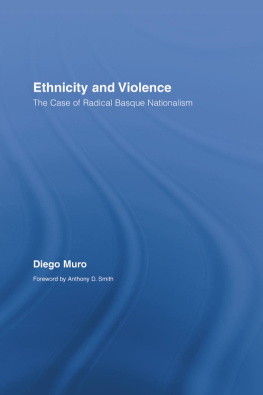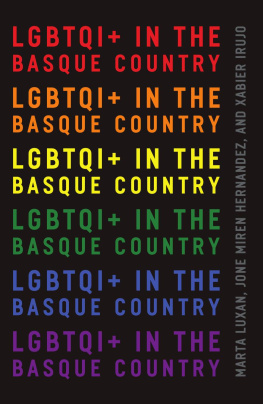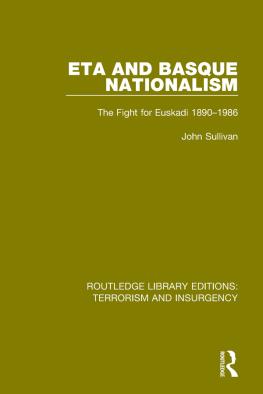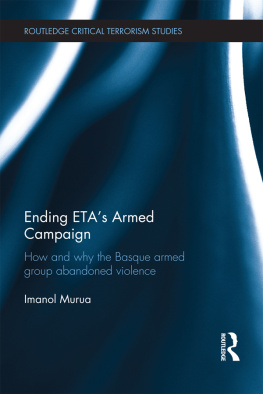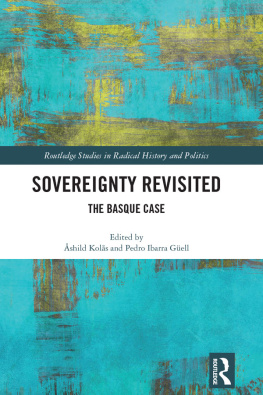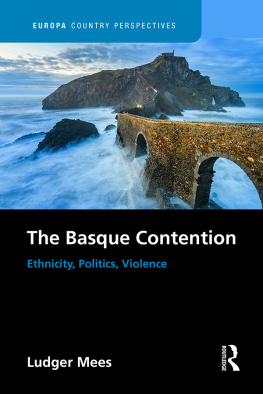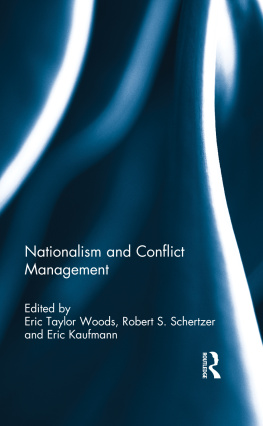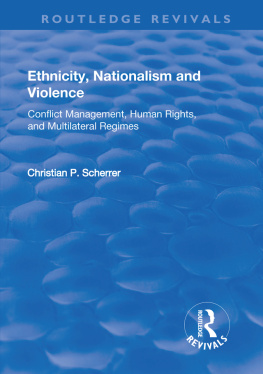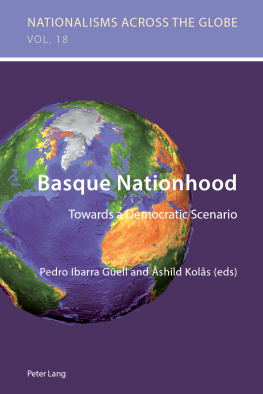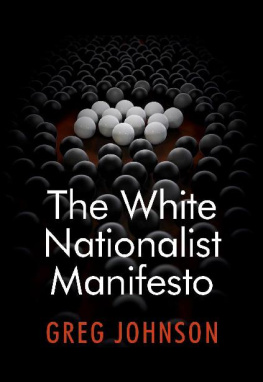Ethnicity and Violence
Routledge/Caada Blanch Studies on Contemporary Spain
EDITED BY PAUL PRESTON AND SEBASTIAN BALFOUR
Caada Blanch Centre for Contemporary Spanish Studies, London School of Economics, U.K.
Spain 1914 1918
Between War and Revolution
Francisco J. Romero Salvad
Spaniards in the Holocaust
Mauthausen, Horror on the Danube
David Wingeate Pike
Conspiracy and the Spanish Civil War
The Brainwashing of Francisco Franco
Herbert R. Southworth
Red Barcelona
Social Protest and Labour Mobilisation in the Twentieth Century
Edited by Angel Smith
British Women and the Spanish Civil War
Angela Jackson
Women and Spanish Fascism
The Womens Section of the Falange 193459
Kathleen Richmond
Class, Culture and Conflict in Barcelona, 18981937
Chris Ealham
Anarchism, the Republic and Civil War in Spain
19311939
Julin Casanova
Catalan Nationalism
Francoism, Transition and Democracy
Montserrat Guibernau
British Volunteers in the Spanish Civil War
The British Battalion in the International Brigades, 19361939
Richard Baxell
Gunpowder and Incense
The Catholic Church and the Spanish Civil War
Hilari Raguer, translated by Gerald Howson
Churchill and Spain
The Survival of the Franco Regime, 194045
Richard Wigg
The Foundations of Civil War
Revolution, Social Conflict and Reaction in Liberal Spain, 1916 1923
Francisco J. Romero Salvad
Ethnicity and Violence
The Case of Radical Basque Nationalism
Diego Muro
Also published in association with the
Caada Blanch Centre:
Spain and the Great Powers
Edited by Sebastian Balfour and Paul
Preston
The Politics of Contemporary Spain
Edited by Sebastian Balfour
| Routledge | Routledge |
| Taylor & Francis Group | Taylor & Francis Group |
| 270 Madison Avenue | 2 Park Square |
| New York, NY 10016 | Milton Park, Abingdon |
| Oxon OX14 4RN |
2008 by Diego Muro
Routledge is an imprint of Taylor & Francis Group, an Informa business
International Standard Book Number-13: 978-0-415-39066-8 (Hardcover)
No part of this book may be reprinted, reproduced, transmitted, or utilized in any form by any electronic, mechanical, or other means, now known or hereafter invented, including photocopying, microfilming, and recording, or in any information storage or retrieval system, without written permission from the publishers.
Trademark Notice: Product or corporate names may be trademarks or registered trademarks, and are used only for identification and explanation without intent to infringe.
Library of Congress Cataloging-in-Publication Data
Ethnicity and violence : the case of radical Basque nationalism / Diego Muro.
p. cm. -- (Routledge/Caada Blanch studies on contemporary Spain ; 15)
Includes bibliographical references and index.
ISBN-13: 978-0-415-39066-8 (hardback : alk. paper)
1. Pas Vasco (Spain)--History--Autonomy and independence movements. 2. Nationalism--Spain--Pas Vasco--History. 3. ETA (Organization)--History. I. Muro, Diego.
| DP302.B55E84 2007 |
| 320.5409466--dc22 | 2007010358 |
Visit the Taylor & Francis Web site at
http://www.taylorandfrancis.com
and the Routledge Web site at
http://www.routledge.com
To my parents
From the start, one discerns in it the (fruitful or calamitous) role taken, in the genesis of events, not by happiness but by the idea of happiness, an idea that explains the Age of Iron being coextensive with history why each epoch so eagerly invokes the Age of Gold. Suppose we put an end to such speculations: total stagnation would ensue. For we act only under the fascination of the impossible: which is to say that a society incapable of generating and of dedicating itself to a utopia is threatened with sclerosis and collapse.
Emile M. Cioran, History and Utopia
Blood and time are needed to make a nation.
Peixoto, ETA leader
Contents
Tables, Figures, Illustrations, and Map
Foreword
In a world afflicted by many different kinds of violent conflict, it is all the more important and urgent to analyse their forms and uncover, if possible, their causes. This is what Dr. Diego Muros book seeks to do. By examining in depth one salient case of one all-important type of intractable conflict, he has illuminated some of the dark places of ethnic solidarities and nationalist ideologies. The originality of his analysis is revealed in the way in which a well-known and well-researched conflict, between the Basque military organisation, ETA, and the Spanish state both under dictatorship and democracy, is shown to be a development of mainstream Basque nationalism, and of the combination of its cultural and political components. For, although Dr. Muros book gives us a firm chronological and political account of the development of Basque nationalism, it also analyses the basic elements from which not only Basque, but many nationalisms, have been forged; and it is this comparative reference that is particularly valuable for an understanding of the dynamics of nationalism.
What are these elements? There is, first, the role of ethnicity. Dr. Muro here follows Barth in emphasising the importance for Basques, and especially for Sabino Arana and other Basque nationalists, of the boundary-marking dimension of ethnic ties. While the content of Basque conceptions of their ethnic solidarity changed over the course of the twentieth century, the existence of a sharp? boundary between Basques and foreigners, including immigrants, persisted throughout. Dr. Muro here gives an especially lucid account of the reasons for these changes, and the political advantages of these reinterpretations of ethnic difference. At the same time, he shows us why the belief in a deep continuity of the Basque nation, at once pure and chosen, and secluded from past invaders, has been the cornerstone of all kinds of Basque nationalist ideologies, including the most radical, and accounting for the strong strain of separatism. This belief is linked to a second element, the myth of a Golden Age. Developed by various Basque intellectuals from the sixteenth century onwards, this myth painted a glorious past age of splendour when the Basque nation was free and independent, preserving its own customs and institutions and its mountainous settlements and way of life. For Dr. Muro, it is not so much the content as the function of the myth that is crucial: he shows us that through this vision of the glorious past, Basque radical nationalists, in particular, have been able to inspire and mobilise their compatriots to self-sacrifice. This is because the vision contains a kernel of truth that resonates among the Basque population, constituting another element which radical Basque nationalism shares with many other nationalist movements.

